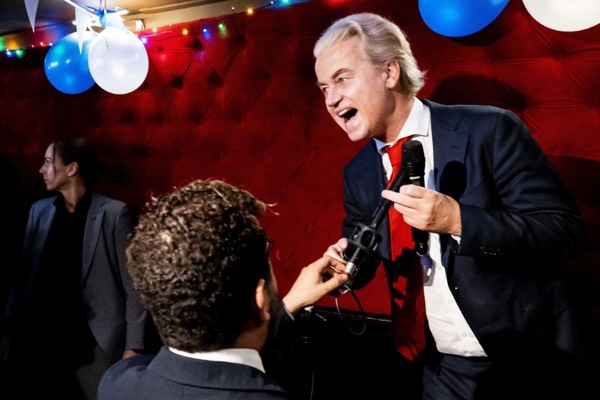The 2023 general election victory for the far-right and populist Party for Freedom (PVV) led by Geert Wilders, sent shockwaves through the Netherlands.
The PVV was not on the radar for a major victory – due to Wilders far-right and anti-Islam views – and has left some Dutch citizens confounded.
Since Wilders and the PVV have strict views on immigration, as expats and highly skilled migrants it is now critical to learn more about Geert Wilders and his party.
In the first of a 2-part blog series related to the winner in this year’s general election, we will breakdown everything you need to know about Geert Wilders and the PVV.
Our second blog will delve into the current political ideologies of Wilders and the PVV and how this can impact the future of expats and highly skilled migrants in the Netherlands.
Geert Wilders: Far-Right Populist
Whether it is his populist ideologies, the peroxide-bleached blond hair, or the obsession with his two pet cats, Geert Wilders, 60, is one of the best-known policy makers in the Netherlands.
Dubbed as the “Dutch Trump” by international press, Wilders has been part of the Dutch political landscape for over 25 years.
Born in Venlo, Wilders first stint in politics came in 1997 when he was elected to Utrecht city council representing VVD. A year later he had a seat in parliament.
In 2004, Wilders was expelled from the VVD after consistently speaking against VVD’s support of EU Turkish membership and other party ideals.
Wilders remained in parliament as an independent before setting up the PVV. As PVV leader, Wilders became the outsider among Dutch political parties.
One of the critical moments that lost him any remaining allies in parliament came in 2010. Triggered by the financial crisis, the VVD sought to pass a €14 billion budget cuts package. Wilders (who’s party had 25 seats in parliament) refused to sign. 18 months later, the government collapsed.
Today, following the Nov. 22 election, Wilders now has the possibility of being the next prime minister.
Wilders Political Controversy
Throughout his career, Wilders has managed to ruffle the feathers of both local and international governments and politicians.
Notable scandals under public scrutiny include the release of his film Fitna and a concept he dubbed Henk and Ingrid.
The film led the British Government to refuse Wilders entry into the country in 2009. As reported by the Associated Press, British government officials claimed he posed a threat to “community harmony and therefore public security.”
Wilders has appeared in Dutch courts numerous times for incendiary remarks towards Moroccans. Back in 2014, Wilders was convicted of insulting people of Moroccan descent and rallying for fewer Moroccans. In the end, he was cleared of incitement.
In 2016, Wilders publicly hailed Donald Trump’s win in the US presidential elections. Wilders was repeatedly cited calling Trump’s victory “as Americans taking their country back.”
Presently, throughout the EU, Wilders remains unpopular. Since 2005, when he aided in derailing an EU constitution bid, Wilders has positioned himself as anti-EU.
During his 2023 campaign, Wilders is quoted promoting the Netherlands leave the EU – which he dubs “Nexit”
Geert Wilders Launches the PVV
When the People’s Party for Freedom and Democracy (VVD) ejected Wilders over opposing views in 2004, they expected Wilders to return his parliamentary seat.
Instead, Wilders remained in parliament as a one-man party until 2006. In 2006, the Party for Freedom (PVV), developed by Wilders, was registered with the Electoral Council.
Wilders and the PVV won its first seats in parliament during the 2006 general election. But controversy quickly followed the new party.
In December of that year, HP/De Tijd, a Dutch opinion magazine, published a piece where the PVV was described as a cult with an extremely distrustful leader demanding complete loyalty.
Yet, support for the PVV continued to grow. In 2010, the party became the third largest in parliament. By 2017, the PVV held 20 seats in parliament.
Currently, after the Nov. 22 parliamentary election, the PVV finished in first place with 37 seats.
The PVV is a combination of conservative and right-wing ideologies combined in a populist agenda. The party is unique because there is no membership and is referred to as a ‘one-man show.’ Additionally, the PVV does not hold annual conferences in which supporters can have their say.
In Part Two
Wilders and the PVV victory pose a major shift from the Dutch political landscape we have come to understand. During his victory speech, Wilders exclaimed his goal is to “put the Dutch back as number one.”
What this means for non-Dutch communities is unclear. Therefore, now is the time for expats, highly skilled migrants, and international students to get informed.
In our second blog in this series, we will deep dive into the PVV’s 45-page manifesto and Wilders political agenda. We will then walk through what this victory can mean for the future of foreigners in the Netherlands.
In the meantime, follow us on LinkedIn where we will be sharing relevant news and updates regarding immigration, 30% ruling, housing, education, and more.








